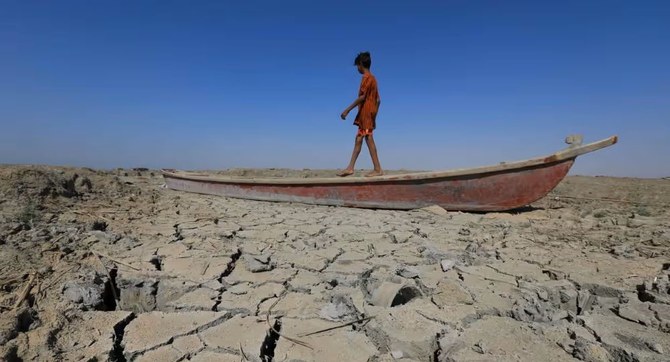DR. MAJID RAFIZADEH. November 30, 2023
The drought that has significantly impacted Iraq, Syria and Iran for the last three years is affecting millions of people. It is critical for the international community, particularly developed countries, to take immediate action.

This drought, which began in 2020, is considered the second-worst on record anywhere in the world. Two factors — higher temperatures and lower levels of rain — have played key roles in the intensity of the drought. A study published this month by World Weather Attribution, following work by scientists from Iran, the Netherlands, the UK and the US, highlighted: “From boreal winter 2020 onwards, a large region in West Asia, encompassing the Fertile Crescent around the rivers Euphrates and Tigris as well as Iran has suffered from exceptionally low rains and elevated temperatures.”
The drought has affected millions of people in the region. In Iran, seven provinces — Sistan and Balochistan, South Khorasan, Khorasan Razavi, Kerman, Hormozgan, Khuzestan and Isfahan — have been significantly impacted by water shortages. This has forced many people to leave villages in rural areas. And it has been particularly impacting the most vulnerable groups in society, including women and children. In 2021, water shortages compounded Iran’s other problems and led to a series of protests, which initially broke out in Khuzestan province before spreading to other parts of the country. Chants such as “I am thirsty” became popular.
Extended droughts have a significant impact on the agricultural industry, turning arable lands into barren desert, forcing farmers to move to cities in search of other jobs and subsequently leading to a food security crisis, hunger and large-scale displacement in the country.
For example, in 2021, Syria was only able to harvest 25 percent of the wheat that it used to grow before the civil war erupted. More than 12 million people have been forced to leave their homes in Syria since the outbreak of war in 2011, including nearly 2 million living in rural areas who have been displaced by drought, according to MedGlobal.
In Syria, access to water has become one of the greatest challenges in some parts of the country, including Suwayda. This has exacerbated people’s dire economic situation due to the fact it has contributed to higher costs for obtaining basic needs such as food, water and energy.
In Iraq, the drought caused a 29 percent drop in water flow in the Tigris River in 2020-21 and a 73 percent drop in the Euphrates flow. Iraqi Prime Minister Mohammed Shia Al-Sudani, in a speech to open the two-day Iraq Climate Conference in Basra in March, warned that “more than 7 million citizens have been affected in Iraq … and hundreds of thousands have been displaced because they lost their livelihoods that rely on agriculture and hunting. The most disheartening aspect is the severe drought that harmed our beautiful marshes.”
It should be noted that, if water scarcity continues to increase to the extent that freshwater resources are depleted in West Asia, this would have an impact on national security and political stability as well.
Unfortunately, droughts of such longevity and severity have become common in the region. One of the main causes is human-made, as climate change and global warming are causing temperatures to increase and rainfall to decrease. This is making Syria, Iraq and Iran hotter and drier. As temperatures continue to rise, the situation is unfortunately only going to get worse. The World Weather Attribution report stressed that, if the world had not warmed by 1.2 degrees Celsius since the mid-19th century, “it would not be a drought at all” in Syria, Iran and Iraq.
The Middle East and North Africa is one of the most vulnerable regions when it comes to climate change because of its dry or semi-dry environment. Temperatures in MENA are rising almost twice as quickly as in other parts of the world, according to a 2022 report by the Cyprus Institute’s Climate and Atmosphere Research Center and the Max Planck Institute for Chemistry. This is why countries such as Iraq, Syria, Jordan and Iran have witnessed such significant desertification. The region is already characterized as the most water-scarce in the world. Water scarcity is a critical factor for the Middle East because of its rising population growth
The world ought to take action in order to reduce greenhouse gas emissions, conserve water and adopt more sustainable strategies. This human-made crisis can be resolved if we pursue and implement greener policies in order to reduce global warming, such as adopting more efficient and sustainable practices.
Climate change and global warming are causing temperatures to increase and rainfall to decrease.
Dr. Majid Rafizadeh
Unfortunately, developing countries, as well as communities with lower socioeconomic classes, such as a high population of older people, women and children, disproportionately experience the impact of losses and damages caused by global warming. According to a 2022 Dartmouth College study, global warming caused by only five countries has caused $6 trillion in global economic losses. And these losses have not been “suffered equally. The burden has fallen disproportionately on low-income countries that have contributed the least to the problem.”
Other steps to take include addressing unsustainable agricultural practices and the mismanagement of water, such as diverting rivers for manufacturing purposes. As Kaveh Madani, former deputy head of the Iranian Environment Department, has pointed out, the problem is “rooted in decades of bad management, poor environmental governance and lack of foresight.”
In summary, global warming is the main cause of the three-year-long drought that has hammered Syria, Iraq and Iran. To tackle this issue, all countries, particularly those in the developed world that are contributing the most to global warming, must take action in order to reduce their greenhouse gas emissions.
Dr. Majid Rafizadeh is a Harvard-educated Iranian-American political scientist. X: @Dr_Rafizadeh
